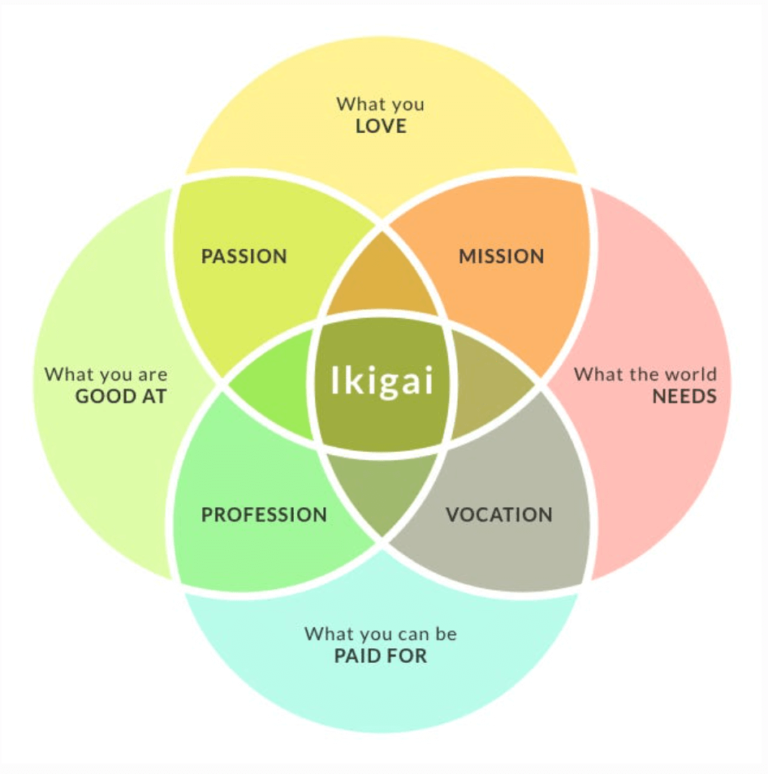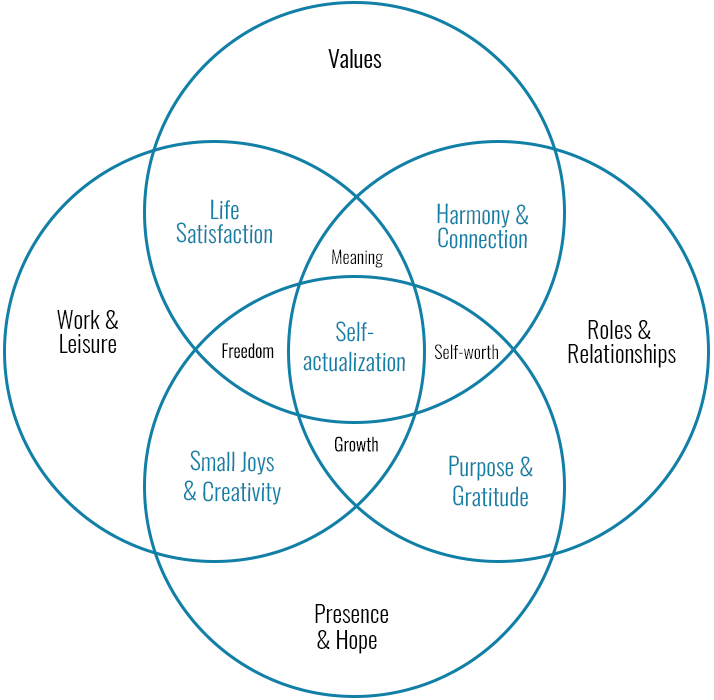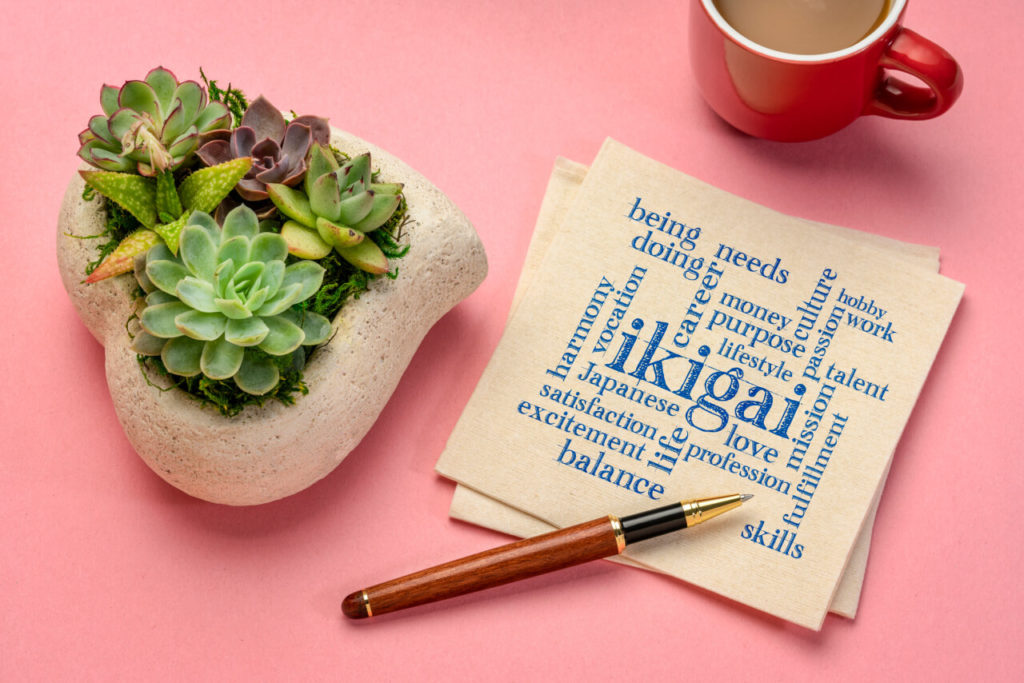The Japanese ‘ikigai’ concept can help us reflect on what is important to us in life
and what we get up for in the morning
When living in Japan, I loved learning about Japanese culture and was fascinated by many beautiful Japanese concepts. One concept, that stands out particularly to me is the one of ikigai, which can be roughly translated to “the reason for living” or “meaning for life.” Iki means “life” while gai stands for “value” or “worth.” Ikigai hence describes your life’s bliss or purpose—what it is worth living for. It is a personal driving force in everyday life—the reason you get up for in the morning.
The mainstream interpretation of ‘ikigai’
in the Western world: 4 questions to ask yourself
In Western societies, the ikigai concept has been brought up in many books and coaching programs in recent years. Often it is depicted as a Venn diagram, with people’s ikigai lying at the intersection of four components: what you love doing, what you are good at doing, what the world needs, and what you can get paid to do.

Source: Forbes (based on diagram by Marc Winn)
Nowadays, many people are split between two seemingly conflicting wishes: on the one hand, to live a purposeful life in which they feel they can realize themselves and their talents and make a positive contribution to the world. And on the other hand, the desire and the necessity to make money so that they can take care of the monthly bills and enjoy a pleasant life. And here, the “Westernized version” of ikigai can come in handy. It shows that you can address both of these aspects if you find the above-described intersection. It’s about reflecting on what you really enjoy doing and then using it in your work and in following your life vision.
How Japanese people interpret the term ‘ikigai’
While the above Venn diagram can be very thought-provoking and useful to apply in one’s life, it has been challenged that this is actually the way Japanese people themselves interpret the term ikigai. Nicolas Kemp, ikigai coach and Japanologist, has been working over the past years on providing a different version of the ikigai concept—one that is more in line with how Japanese people interpret it.
He points out that while the concept of ikigai is important to the average Japanese person, it is used in casual conversations without all the hype around it found in Western societies. And, maybe even more importantly, for Japanese people, their ikigai does not have to be linked to a profession or to making money. In fact, in most cases, it has nothing to do with the pursuit of making money. Instead, Kemp describes it as “a spectrum that includes all the things we value, from the little joys in life to the pursuit of life-defining goals.” And for many Japanese people, their ikigai is related to family and community.
For example, the ikigai of the grandmother of a Japanese friend of mine is to have large family meals with the entire family on one day of the week. This is what she looks forward to and what represents a big part of her life purpose. Likewise, I have heard from people whose ikigai is to take care of their sheep or their vineyards each day. It is what makes them get up in the morning—a reason, a purpose to live for. Your ikigai can also be your children, a cause you work for, or just about anything that fulfills you with a sense of purpose for a life worth living. I personally believe that we can have several ikigais as we might have several things we get up for in the morning.
The alternative ‘Ikigai Framework’
by Nicholas Kemp
Nicolas Kemp and the Japanese professor, Akihiro Hasegawa, both experts in the Japanese interpretation of the term ikigai, have come up with another Venn diagram—one which might be closer to the way Japanese people interpret the concept.

The “Ikigai Framework” by Nicholas Kemp
in cooperation with Prof. Akihiro Hasegawa
Kemp emphasizes the importance of knowing yourself and your values, as these will ultimately define what is important to you. Another core aspect is that you live consciously in the present moment and have a strong sense of hopefulness, believing that life is moving toward a better future. According to him, “values” and “hope” can be considered the foundation of ikigai.
The sources of our ikigai can be our work, hobbies, interests, and our roles and relationships. Our ikigai perception or feeling comes in where the outer circles overlap with each other. So, for example, if we live our values in our roles and relationships, we will experience harmony and connection. If we are present in our work, interests, or hobbies, we are more likely to recognize and savor the small joys of life and express our creative selves.
Living and perceiving our ikigai in these ways will bring us to experience meaning, self-worth, growth, and freedom in our lives. And all these aspects will lead to “self-actualization,” the ultimate aspect of ikigai: knowing who you are and becoming the most honest, most true version of yourself. Thinking about one’s ikigai in the Japanese sense can also be a beneficial tool in digging deeper into what makes our daily life meaningful and purposeful.
How to apply the ikigai concepts to your life
The silver linings of life lessons and how they can lead you to your life purpose
The above concepts and the questions can help us reflect deeper on what is important to us in life. Yet, there is one more thing that I would like to point out: to become aware of the silver linings that life lessons have brought to us. Oftentimes, we learn the most needed lessons when facing situations of upheaval or crisis. When we face difficulties, no matter in which area in our lives, we might start to ask ourselves questions. And while we might be in a state of self-pity or cluelessness for a while, it is often during times of crisis that we become particularly creative or start to think out of the box. When we observe certain life situations in retrospect, we might notice that they have shaped us in a unique way and are leading us to where we are meant to be if we open our eyes and draw our lessons. And past lessons can give us essential insights into our values, life priorities, and life purpose.
I believe that it is worth pondering the above questions and concepts from time to time to feel more in line toward living the life we want to live, and I hope that these questions can give you some inspiration and food for thought as well!




